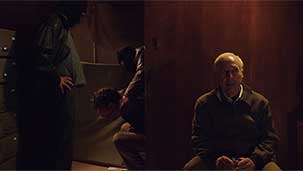The Clan is an object lesson in how to make a true crime drama. And your performance as the patriarch (aptly named Arquímedes Puccio) of a truly bizarre family is an object lesson in how to portray a fully rounded human monster.
An Argentinean film from 2015, The Clan is a scathing rebuttal to the over wrought superficiality of recent english language films of the same species—Gangster Squad and Black Mass are two of the most obvious culprits that use surface sheen and heightened performances (as well as prosthetics) to obscure their lack of real depth. The Clan, by contrast, is a superior piece of filmmaking. Central to the films success is your pitch perfect depiction of the corrupt head of a crumbling family—whose business happens to be kidnapping.
Each moment you are screen you transmit a kind of barely restrained rage that is an echo of Ben Kingsley’s Don Logan in Sexy Beast—both of your characters are creatures of almost entirely unrestrained id, the difference being yours is a quiet, calculating rage. Your Arquímedes is a despicable creature, prepared to use even his own children as co-conspirators. He’s so callous that he keeps and tortures his victims in a room in his own home—while his two young daughters are kept awake by their keening wails.
This is the true story of the Puccio family, three sons, two daughters and a wife. Each of whom seems to be the usual working class family member: the father a shopkeeper, the mother a teacher, the middle son a rugby star. Yet each of them were also either complicit in—or at least aware of—the family’s real business. Taking advantage of the political chaos in Argentina during the early eighties the Puccios kidnapped and murdered several young men and women from well to do families—all the while being shielded from prosecution by their ties to the military.
The Clan is a remarkably deft example of a particular sort of neo realism. Directed with restraint and subtlety, it maintains close contact with the central characters while the larger political concerns play at the margins. This is a film firmly embedded in the struggles of the Argentinean working class during a period of post war political upheaval. Concentrating on this specific family is what makes this narrative so compelling, but, in many moments, it also feels like an uncomplicated kitchen sink drama about a traditional family coming apart at the seams.
The real horror of The Clan doesn’t come from Arquímedes’ casual disposal of his victims once they have served their purpose, but from how relentlessly he bullies and cajoles his family into compliance. And while his wife is equally guilty—her cold blooded emotional manipulation is as chilling as his rage—Arquímedes is the catalyst for his family’s inevitable downfall.
There was never a moment when I was taken out of this film, either by the direction or a false step in the performances. The Clan is a rare film: both fascinating and grounded, a close cousin to cinema vérité, yet still a full-throated drama.
And finally, the last two minutes of this film are perhaps the most affecting I have experienced while watching a film in a long time—the irony so tragically rich that it still sticks in my throat.
Sincerely,

Tim







